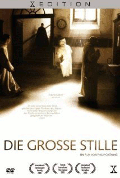
Directed by
Philip Groning
169 minutes
Rated G
Reviewed by
Andrew Lee

Into Great Silence
Synopsis: The Grande Chartreuse is the mother house of the Carthusian monastic order. Founded in the 12th century, the Carthusians are amongst the most rigorous and disciplined of all Catholic monastic orders. They live in total seclusion, in silence, in order to contemplate God. Director Philip Groning asked if he could make a documentary about them. They were not ready, came the answer, they would get back to him. Sixteen years later they called again, they were ready.
“He who does not give up everything cannot be My disciple.”
As a general rule, a documentary tells you about its subject. Often this is simply facts, dates, personal reminiscences. But you won’t find that here. You won’t learn much about the history of the Carthusian order, their vows, the rules they run their lives to. This is not a documentary of external facts, but of the inner life of a monk. A documentary of the monastic spirit.
The monastic life is one of solitude, silence, repetition and reflection. Such a thing is not easy and neither is this film. At nearly three hours it will try the patience. With almost no talking and only the sounds of creaking floorboards, the call to prayer and the sighing of the wind, it could also give you a feeling of sensory deprivation. But these are the marks of the monastic life. They don’t come easily. Just as the monks have to struggle to maintain their recollection before God, so the audience may find themselves struggling to maintain attention on the screen. Like the monks themselves, the film unhurriedly follows life through the charterhouse. A series of Bible verses are repeatedly presented as intertitles, adding new meanings each time as the scenes of monastic life play out. The silence is awing, and if you’re willing to become lost in it, it can be a transcendent experience. The film leads you into the silence where one can find peace.
So many people now embrace the idea of sea-change, of changing their life’s priorities. The men of this film make those moving to the seaside look like sissies. To better enjoy their lives and focus upon God, they strip away everything that could take them away from the object of their happiness. So rigorous, so austere and yet nobody is downcast. There is a quiet joy in everything they do. And it’s infectious. There are moments of surprising humour and playfulness, like the monks cavorting in the snow, sliding down the hillside on their cassocks. It’s a simple exuberance for life that amply demonstrates that these men have not retreated from the world to condemn it, but simply to celebrate it more fully. These monks have a joy in their lives that is enviable. By the simple focus on the love of their lives, God, they have transformed what was, in the Bible, a lament by the prophet Jeremiah, into a hymn of praise. It is also a good description for the experience of the film itself:
“You seduced me, O Lord, and I let myself be seduced.”

Want more about this film?


Want something different?




